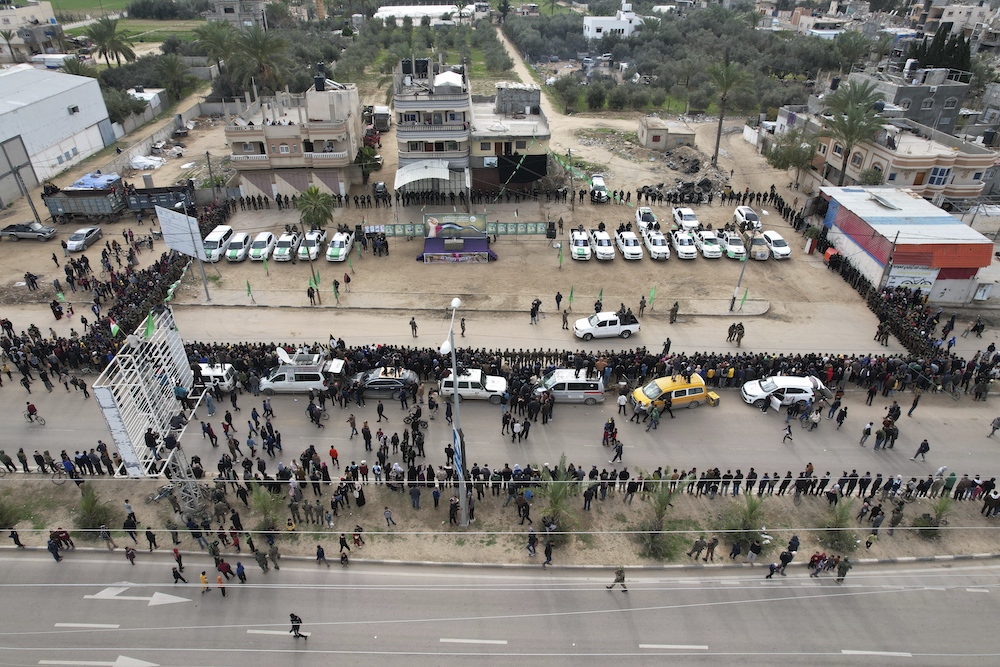DUBAI: More than 300 million people around the world will need humanitarian assistance and protection in 2025, according to the Global Humanitarian Overview.
The conflicts in Gaza and Ukraine have dominated international attention, while other crises — such as those in Sudan, Myanmar and Venezuela — continue to affect millions.
The World Economic Forum in Davos drew attention to these crises, bringing together Comfort Ero, the president and CEO of International Crisis Group; Catherine Russell, the executive director of UNICEF; and Ricardo Hausmann, founder and director of the Growth Lab at Harvard University. The panel they attended was titled “Crises Beneath the Headlines” and moderated by Ishaan Tharoor, the foreign affairs columnist at The Washington Post.
Ero said that it was the first time in the group’s 30 years of operations where its work was dominated by “big power rivalry and major power competition,” which “infects” and influences many conflicts.
Although there are fewer conflicts, particularly in Africa, it does not mean there are not any conflicts, she added.
Ero said: “I do not necessarily think that these conflicts are off the radar; they have been deprioritized because of the bandwidth and the capacity, and because there’s just an inordinate amount of conflicts on the rise at the same time.”
Russell said that UNICEF, too, was struggling to respond to the sheer number and scale of crises.
She said: “We estimate that more than 213 million children live in 146 countries and territories and will need humanitarian assistance. The numbers are just overwhelming.”
Crises in Haiti, Myanmar, Sudan and Syria are also on UNICEF’s agenda, but the organization faces funding issues with 50 percent of the humanitarian funding it receives going to only five emergencies, Russell said.
She spoke about the massive numbers of children affected in Haiti and Sudan.
Some 700,000 people, including 365,000 children, are displaced because of violence perpetrated by armed gangs, and 6 million people need humanitarian assistance, with serious food insecurity an added issue in Haiti.
In Sudan, 19 million children are school-aged and 17 million of them are out of school and have been for more than a year.
While Syria has had a recent moment of triumph, its infrastructure has completely collapsed and millions of children are out of school and living in areas with landmines, which have become a leading cause of death and injury, she added.
“Attention draws resources, and so not having a lot of attention (drawn to these issues) is a problem,” Russell said.
Latin America is not free of issues either, with Venezuela being in the midst of a political and humanitarian crisis exacerbated by Nicolas Maduro, its president, remaining in office despite a six-month-long election dispute, international calls for him to stand aside, and an increase in the US reward offered for his capture.
Hausmann described the country’s downfall as “poetic in some dark sense.”
Despite Venezuela sitting on top of the largest oil reserves in the world, its gross domestic product has collapsed by 75 percent — “that’s three Great Depressions” — and 8 million people have left the country, he said.
Hausmann added that “Venezuela’s biggest obstacle is the government,” which has become an “international criminal organization” involved in “narco trafficking, money laundering, (and) the finance of terrorism.”
He said: “We have a situation where you have a government that has a deep internal sense of illegitimacy, and in the process of trying to survive it has destroyed the legitimacy of all other organizations (such as) the National Assembly, the Supreme Court, the attorney general, the army, etc.”
Looking to the future, he said, Venezuela was receiving mixed messages from the US with some people, like Secretary of State Marco Rubio and National Security Adviser Mike Waltz, “showing a willingness to be helpful in re-establishing democratic order,” while others, like Ohio Sen. Bernie Moreno, were “more or less normalizing Maduro.”
Tharoor asked the panel how the work of international groups had been affected at a time when countries were shaping their messaging for a “Trumpist world” and becoming more “nation-first.”
Ero said that we “can’t divorce ourselves” from the nation-first approach or from “national interest.”
But, she added: “There is a serious question mark about the crisis of the crisis management system itself, where it’s very hard now to see who the key mediators are that have the influence and leverage to change the dynamics in a country like Sudan. We are in a crisis of peacemaking.”
Organizations like UNICEF and other humanitarian aid agencies are doing what they can but Russell described them as a “band-aid” that arrives due to political failures.
She said: “We save millions and millions of lives, but we’re not the answer. The answer is to stop the conflict in the first place. We have no power to do that, and so we are at the mercy of this really dysfunctional political system.”
She added that the countries that make up the UN Security Council “have to come together and decide that they’re going to put their own interests aside, hopefully, and try to look out for what’s best for their countries and their regions and the world at large.”

























